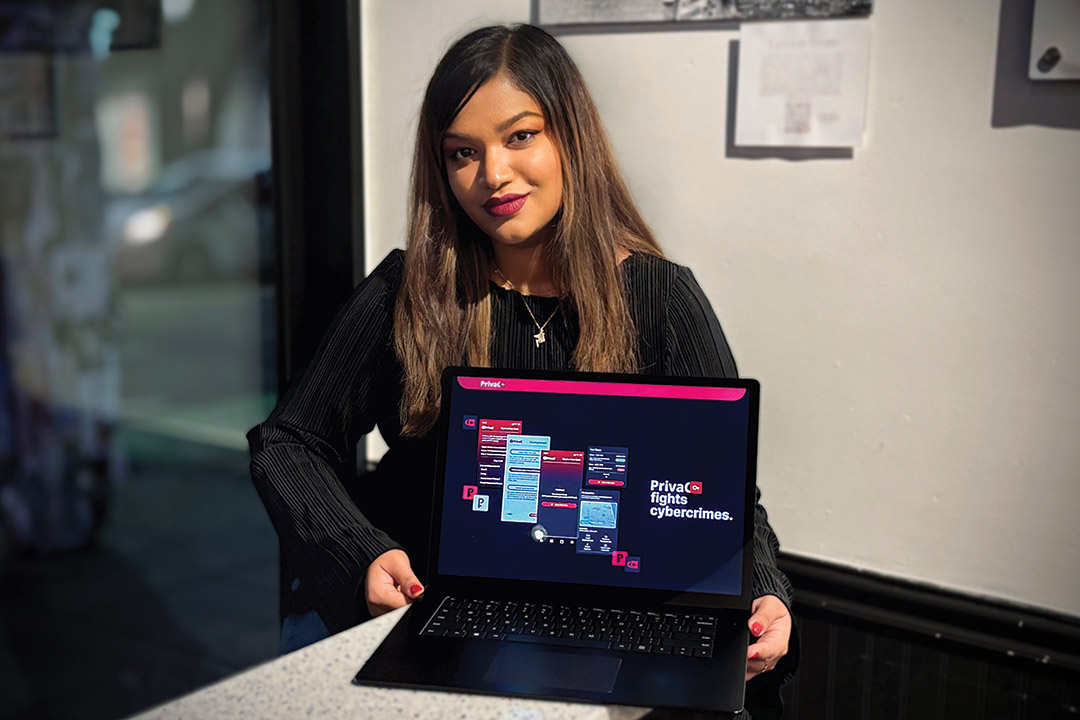Alumna goes from struggling with coding to creating technologies for coders
It took Nuzhat Minhaz ’23 (computing and information technologies) a few tries to find her place in the technology industry. Despite failing Introduction to Computer Science twice, Minhaz is now working at Microsoft and running her own startup organization to help cybercrime victims in Bangladesh.
Nuzhat Minhaz ’23 (computing and information technologies) isn’t afraid to tell people that she failed the Introduction to Computer Science course—not once, but twice.
Although she struggled with coding at first, Minhaz has found strength in being open to failure. She credits the hackathon opportunities she found at RIT, which led to a job at Microsoft and the creation of her startup that aids victims of cybercrimes in Bangladesh.
“Being able to ask for help and advocate for yourself is so important,” said Minhaz. “You’d be surprised how life-changing that can be.”
Growing up in Bangladesh, Minhaz viewed technology as a way to create social impact. She saw struggles with political turmoil, gender discrimination, and poverty and wanted to make solutions for people in communities similar to her own.
“However, when I started coding, I couldn’t relate to why a Python turtle moving from point A to point B on my screen was important for me to learn before creating people-centric solutions,” said Minhaz. “It was frustrating, but so many people at RIT wanted to help me reach my aspirations in tech.”
While revisiting her decision to pursue computer science as a major, she discovered computing and information technologies. The degree program allows students to explore different areas of complex computing systems before specializing. She also entered her first Women in Computing hackathon, where she came up with the idea for PrivaC—an app that connects cybercrime victims in Bangladesh with lawyers, psychologists, and other verified professionals who can provide expertise.
Today, PrivaC is building a web application and conducting research to develop a business model and user experience that supports both victims and experts. Several current RIT students and alumni are involved with the organization. As founder of the startup, Minhaz is also dedicated to creating opportunities for all genders to explore technology in Bangladesh. In 2020, PrivaC organized the country’s first virtual hackathon for women, PrivaShe Hacks.
Minhaz also found co-op opportunities through hackathons at RIT. Then, work mentors steered her toward a dream career path that she had never heard of before.
“Product management is about understanding people and their needs and translating those into technical specifications,” Minhaz said. “You then design systems and architecture based on validated research, not just creating things because they look pretty.”
Minhaz is now a product manager at Microsoft’s Developer Division within Cloud+AI. The division creates tools, technologies, programming languages, and experiences for programmers across the globe. She is leading Experimentation, a new product within Azure cloud services that will allow programmers to test and gain insights on which features will best help their customers.
Also working at Microsoft’s Developer Division is Python creator Guido van Rossum. One of the first things Minhaz did on the job was send him a message about her coding journey, especially the struggles.
“He responded with a smiley face. I was like, ‘my life is now complete.’ And I’m now able to learn to code in any language.”










